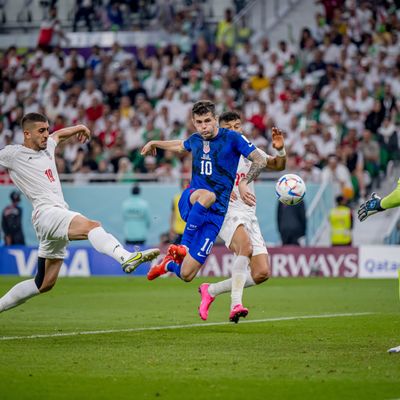
One of the reasons people love sports — one of the reasons they try so hard to protect them, to cordon them off as a sacred space outside the pressures and pains of everyday life — is that, in the end, all that really matters is what happens on the field. And while a single-minded focus on athletic glory can lead to dark places, a world in which there are clear, definitive winners and losers has its undeniable pleasures.
For all the myriad subplots and controversies swirling around the U.S.-Iran World Cup match on Tuesday afternoon in Qatar, in the end, the match was just 11 men running around a pitch trying to keep a ball from 11 other men. And it turned out that the USMNT were better than their opponent. This time, the final score showed it.
The USMNT’s 1-0 win over Iran, advancing them to Saturday’s Round of 16 match with the Netherlands — 10 a.m. ET on Fox, get your seats at the bar now — looked like a dominant American performance until the last 20 or so minutes, which was marked by Iranian confidence and nerve-jangling tension. The U.S. had several chances to score in the first half, missing out repeatedly in a fashion familiar from their frustrating draw with England last week. But Christian Pulisic’s shot in the 37th minute of the first half, the U.S. phenom’s first ever in the World Cup, turned out to be enough. It came at great cost, however. On the play, Pulisic suffered a painful-looking apparent abdominal injury that kept him out the entire second half, and which required a trip to the hospital.
A fiery Iran team had many chances late, including a terrifying opportunity in extra time that required a U.S. defender to kick the ball away from an empty net after goalkeeper Matt Turner made a rare mistake. But for all the talk of how well this young U.S. team can attack, they showed that they’re also capable of parking the bus and hanging onto a lead. They made you pull your hair out and eradicate what was left of your fingernails, but they pulled it off. (To beat the Netherlands, the USMNT will have to convert more offensive opportunities. But we can deal with all that later.)
The politics surrounding this game seemed to melt away at the opening whistle. The Iranian players — whose silent, noble protest in their opener against their government started us down a road that ended with a surreal press conference where USMNT coach Gregg Berhalter and captain Tyler Adams had to answer for American geopolitical strategy, systemic racism, and the social-media decisions of an intern half a world away — are just people who, to put it as simply as possible, weren’t as good at kicking the round ball in a rectangular goal as the United States players were. There seemed to be no real aftereffects from the fireworks of the last couple of days, and Berhalter and Iran coach Carlos Queiroz made a big point of publicly embracing before the match. The World Cup is so massive, and so inherently global, that you can forget it is just a game. But it is, in the end, a glorious, thrilling one, where sometimes bad people go home happy and good people go home sad. From the American sports fan’s perspective, the good guys won.
And now they get to go do it again Saturday against the Netherlands — a formidable foe, but one the U.S. has more than a puncher’s chance against. The United States has not made it out of the Round of 16 at the men’s World Cup since 2002, and the Americans have only gotten this far twice in the event’s entire history. A win this weekend will get them to barely charted territory. Sometimes it’s nice to have things be so simple in a complicated world: Win, and everybody’s happy. See you Saturday.
More From This Series
- 7 Takeaways From the Mets’ Blockbuster Juan Soto Signing
- If the Mets Get Juan Soto, They Could Rule New York
- Let Athletes Do the ‘Trump Dance’ in Peace






























